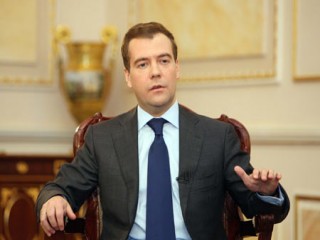
Dmitry Medvedev biography
Date of birth : 1965-09-14
Date of death : -
Birthplace : St. Petersburg, Russia
Nationality : Russian
Category : Politics
Last modified : 2022-03-01
Credited as : Politician, former President of Russia, former Prime Minister of Russia
4 votes so far
Dmitry Medvedev became president of Russia in 2008, succeeding the powerful Vladimir Putin. Since then, Russians and the world have watched since to see if Medvedev or Putin, who became Russia's prime minister, truly holds the most power. Medvedev seems to be more than a puppet but less than a reformer, less authoritarian than Putin but not differing much in his policies from his partner in government.
Law Professor and Political Consultant
Medvedev was born in Leningrad, Russia, in 1965, into a family of scholars. His parents encouraged him to become a scholar himself, and he earned a Ph.D. in law from Leningrad State University in 1990. He stayed at the university for the next nine years as an assistant professor of law while also becoming involved in Leningrad politics. Medvedev began as an adviser to the chairman of the Leningrad City Council. Then, after Communism fell in Russia and the city of Leningrad changed its name back to the pre-Communist St. Petersburg, Medvedev also served as a consultant on external relations to the St. Petersburg mayor's office.
Putin Protege
Medvedev met Putin while working in St. Petersburg politics. Putin headed the external relations committee at the St. Petersburg mayor's office while Medvedev was a consultant to the committee. After Putin became prime minister of Russia in 1999, he named Medvedev deputy chief of staff of the Government of the Russian Federation. Two months later, when Putin became acting president of Russia, he appointed Medvedev deputy head of his presidential administration. Putin also named Medvedev to many other posts in 2000, including head of Putin's successful campaign to win the presidential election and a full term in office. Medvedev was also elected chairman of the board of the state-owned oil and gas company Gazprom. He held that position until 2001, then was deputy chairman until 2002, when he became chairman again.
Presidential Prospects
Medvedev continued to advance in Putin's government, becoming Putin's chief of staff in October of 2003. On November 14, 2005, Medvedev received another major promotion: he was named first deputy prime minister. Putin also named Sergei Ivanov, Russia's defense minister, a deputy prime minister on the same day, and many observers believed that Medvedev and Ivanov were both being given the opportunity as deputy prime ministers to prove themselves capable of taking on the presidency. Medvedev was also put in charge of the Council for National Projects, where he was in charge of doling out billions of dollars in funding for social, educational, and infrastructure programs. Such projects, popular with voters, gave Medvedev a chance to garner support among the Russian people before the 2008 elections.
Ascends to Presidency
The Russian Constitution prevents presidents from serving more than two terms. So in December of 2007, with only a few months to go in his term, Putin announced that he wanted Medvedev to succeed him. Four parties, including Putin's United Russia, announced they would back Medvedev. The next day, Medvedev announced that if elected president, he would appoint Putin as prime minister. Observers speculated that Putin had chosen Medvedev over Ivanov because he would be the weaker successor, allowing Putin to wield power as prime minister.
Medvedev was elected president of Russia on March 2, 2008. His victory was expected. The political and financial backing of the Russian government and ruling party gave him an almost insurmountable advantage over a fractured opposition.
Though Medvedev was seen as friendlier to Western nations than other Russian officials, he twice criticized the United States in late 2008. Responding in July to U.S. Sen. John McCain's call for Russia to be excluded from the Group of Eight economic powers because of its flawed record of support for democracy, Medvedev commented that the United States would have to cooperate with Russia in hopes of overcoming its severe economic recession. When Barack Obama was elected as U.S. president in November, Medvedev threatened to deploy nuclear missiles near Russia's border with Poland, but added he would not do so if the United States reconsidered plans to deploy anti-missile systems in Poland and the Czech Republic. Medvedev retreated from his confrontational stance after conversations with French President Nicolas Sarkozy. But his anger over the balance of power between Russia and Eastern Europe flared up again in August of 2009, when he said he would not send an ambassador to Ukraine. He said Viktor Yushchenko, Ukraine's president, was pursuing anti-Russian policies, such as attempting to join the North Atlantic Treaty Organization and supporting Georgia, the former Soviet republic that fought a war with Russia in 2008.
A year into his term as president, observers were still asking how much Medvedev had shown himself to be independent of Putin. In the first half of 2009, he met with human rights groups and other Russian liberal groups, which had been strongly critical of Putin and had been subjected to severe threats. He told them that government officials should not treat them as enemies, but did not change any policies afterward. Medvedev also granted an interview to a fiercely anti-government newspaper whose journalists had been threatened and attacked. However, observers felt Medvedev was mostly likely striking a different tone than Putin but not differing with him on substantive issues.
In August, during the third month of Medvedev's presidency, Russia took part in the 2008 South Ossetia war with Georgia, which drove tension in Russia–United States relations to a post–Cold War high. On 26 August, following a unanimous vote of the Federal Assembly of Russia, Medvedev issued a presidential decree officially recognizing Abkhazia and South Ossetia as independent states, an action condemned by the G8.
















